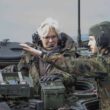Matt Gallagher, a former U.S. military officer and now a researcher at the Institute for Future Conflict at the U.S. Air Force Academy shares his personal experience on the ground as a volunteer trainer and journalist, along with insights from multiple interviews with locals and international legionnaires fighting on the front lines in Ukraine . “The Ukrainian people desperately want and need our help”

Matt Gallagher is the author of four books, most recently the novel Daybreak. He is the writer-in-residence at the Air Force Academy’s Institute for Future Conflict. The views expressed in this article are his and do not reflect the official policy or position of the Institute for Future Conflict, Air Force Academy or the U.S. Government.
“I had been lied to,” JD Vance said.
It was April, and the Republican senator of Ohio — now Donald Trump’s running mate — was on the Senate floor, chiding his colleagues for passing a $61-billion aid package to help Ukraine fend off the Russian invasion. He compared the situation to the Iraq War, in which he’d served as a Marine. “My excuse is that I was a high school senior,” he said. “What is the excuse of many people who were in this chamber or in the House of Representatives at the time and are now singing the exact same song when it comes to Ukraine? Have we learned nothing?”
Vance has emerged as the face of a new movement in the GOP, led by veterans of the wars in Iraq and Afghanistan, that stands against more traditional conservatives’ support for aggressive foreign policy interventions. They say their firsthand disillusionment with quagmires in the Middle East has made them skeptical of U.S. support for Ukraine, staking out an “America First” foreign policy stance. They would have the U.S. abandon its materiel and financial support, even as Russia stepped up its attacks this week.
Some friends I served with in the U.S. Army and in Iraq think as Vance does, and they’ve landed on this view in an honest attempt to make sense of what we saw and did for our country. They’re hardly alone. In 2019, Pew found that 64 percent of vets think the war in Iraq was not worth it. Fifty-eight percent said the same of Afghanistan. And that was before 2021’s ugly withdrawal from Kabul. “What was it for?” isn’t a banality for veterans of the global war on terror, but a daily rumination. And for many of us, the answer is elusive at best and bitter at worst.
But that painful truth has led Vance to the wrong conclusions in Ukraine. We served in Iraq under false pretenses, in a country that largely saw us not as saviors but as invaders. That is not the situation in Ukraine. I know from personal experience on the ground there as a volunteer trainer and journalist, and from multiple interviews with locals and international legionnaires who fight on the front lines. The Ukrainian people desperately want and need our help.
Unlike the Iraq War, their fight is unambiguous: A foreign adversary has invaded the borders of a would-be U.S. ally in an effort to eliminate its sovereign existence. Americans who support Ukraine are not looking for weapons of mass destruction, or imposing our will on a country that does not want us; we are helping stare down a dictator who has his eyes on Western democracy itself.
Yes, we were indeed lied to in Iraq. Lies are a form of betrayal. But does that mean that we in turn should give up on the values that were betrayed as well, the ideals we once believed were worth fighting for?
In the 15 years since my own return from war, I’ve sampled different spots along the ideological spectrum with regards to issues of war and peace, seeking something, anything, like clarity. American interventionism has shown, and found, its limits. One needn’t have once stood in an Iraqi living room trying to apologize for raiding the wrong house to know it.
Though I have done that.
So much was squandered in our forever wars in Iraq, Afghanistan and beyond. The human dead, the wounded, the money, the world’s grace, moral authority, psychic energy … it’s impossible to reflect on what was possible on September 12, 2001, and not consider the roads untaken. The appeal of withdrawing into an isolationist shell, or “America First,” can be a siren’s song for veterans of my generation.
Yet retreating from the international body and its endless ills is no solution, either, morally or pragmatically. One needn’t have walked through a just-liberated Ukrainian village and heard what America can still mean as an ideal to believe this.
Though I have done that, too.
Traveling through Ukraine several times since Russia’s renewed invasion in early 2022 has sharpened my worldview in manifold ways. Truthfully, it’s only in Ukraine that I think America is capable of being what we say we are. Which sounds, perhaps, like an empty aspiration. But on the ground, it’s anything but.
At the Republican National Convention in July, Vance said, “People will not fight for abstractions, but they will fight for their homes.” Which is an interesting line, but of course untrue. Our own country’s history proves people will fight for both, from its inception (what could be more abstract than the idea of a brand-new nation?) through the American century when farm boys from Iowa and city kids from Brooklyn fought and died in forests and on islands halfway across the globe. The thousands of volunteers in Ukraine’s international legion serve as more modern proof, many of them fellow disillusioned veterans of the forever wars.
I think especially of my friend J, whose full name I’m withholding for his safety. We texted recently — he’s got some free time, laid up in a hospital in Lviv, Ukraine, recovering from surgeries on an assortment of combat injuries earned on the front. He’s an U.S. Air Force veteran, spent time in Iraq, and he’s shared with me over the past couple of years how soldiers in Ukraine sometimes feel they’re fighting with one arm tied behind their back, due to the limited weapons shipments and various restrictions placed on their use. J’s primary wish, he once told me, would be for an American government that supported Ukraine full-throttle, without the piecemeal aid. His second wish? “Just a burger and a beer so I could properly celebrate the fact that America would be acting like the United States the world once knew.”
J’s politics differ from my own, but we agree on Ukraine. I’ve met American volunteers there who run the gamut of political persuasions, from anarchists to self-described Reagan Republicans to card-carrying DSA members and people who swear they’ve never voted and never will. Their reasons for soldiering for Ukraine are their own, abstractions though they may be.
L is another American friend of mine in Ukraine. A U.S. Army vet, he’s now a combat medic in the International Legion. Due to the pragmatic nature of his work, he’s not susceptible to high-minded talk of principles and America’s role in the world. But even he can’t help but convey the justness of Ukraine’s war for self-determination and U.S. contributions to it.
“I have become extremely aware of how significant America’s aid is, as well as the impact the American voters have on this war,” he told me. “Ukraine has the fighters, but it needs ammo, equipment and hope to win … hope that the rest of the world hasn’t given up on Ukraine. Americans can hold their heads high and have a true sense of pride knowing you are helping.”
J and L belong to a self-selecting group. Veterans are no monolith, and our community is like any other in that disagreement can and will be found on any subject, Ukraine included. But there’s a refrain of most every Western vet I’ve encountered in Ukraine, whether they’re over there as fighters or humanitarians or volunteers: This is the right thing to do for a people and country that want the peace and security we take for granted and are willing to fight for it themselves.
We’re not aiding Ukraine just for idealism, of course. The geopolitical chess is real, as are the economics. It’s important to acknowledge this when making the case for continued aid to the American people. But for me personally, it matters that 90 percent of Ukrainians have a positive view of the United States and consider us an ally. Everyday, regular people want and request our assistance. Not to put too fine a point on it, but that was not my experience in Iraq, where sheikhs with government contracts may have adored us, but most locals sensed the violence was certain to continue as long as we remained.
Taking issues and events case by case defies the comforts of doctrine. It’s deeply unsatisfying much of the time. But it’s the only way I’ve found to reconcile the many contradictions of our world. There’s a lot of space between Team America: World Police and nationalist myopia.
It’s guaranteed that someone with military experience will become vice president come November, whether it’s Vance or National Guard veteran Tim Walz. Whoever it is, here’s hoping they remember that abstractions, ideas and values can be much more than hollow words to people in pursuit of them. Foolish idealism is not leadership. Neither is a cynicism so curdled and narrow that nothing is worth defending.
The original article published by Politico




